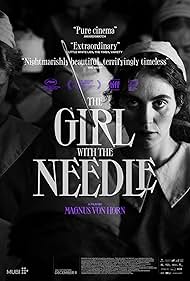Copenhagen 1919: A young factory worker is left unemployed and pregnant. She meets Dagmar, who runs an underground adoption agency. A strong relationship develops, but her world falls apart when she discovers the shocking truth behind her job. Denmark’s official entry for the “Best International Feature Film” category at the 97th Academy Awards in 2025. It’s the final days of the Great War and Karoline is barely making ends meet working in a factory. She believes herself to be a widow because her husband disappeared during the war (even though Denmark wasn’t actually involved), but she doesn’t get widow’s benefits because he’s not listed as dead. There’s a lot going on during the film and I don’t want to get into spoilers, so I won’t go into too much detail about the plot, except that the marketing highlights something that isn’t as big a part of the film as you might expect. While this gets a lot of attention in the second half of the film, for me the real value of the film lies in the sense of reality surrounding Karoline’s story. When was the last time someone in a film tried to convince a potential tenant to take an apartment by telling them they could have running water for two full hours a day (from ten to noon, which may not be a very sellable proposition because most people would be working during those hours)? When was the rampant drug use of the time so openly depicted? Even what Dagmar does was relatively common at the time, although I would venture to guess that the trend was on the decline at this point and wasn’t happening as much as it used to. In fact, I might have enjoyed the film more if the marketing had been different and Dagmar hadn’t been mentioned, as it set the expectations. Although Dagmar is the main character, the film is clearly about Karoline and her struggles. On the other hand, it’s hard to say how I would feel seeing Dagmar Overby’s name on the door if I didn’t know beforehand that this real person was being used in the film. (It’s worth noting that the film is inspired by real events and not based on them, so they try to keep some distance from the real Dagmar.) I think some of the audience will have a hard time sympathizing with Karoline, because at times it seems like she makes the right decision a little too late. At the same time, there isn’t as much time or opportunity for ethics when you’re just trying to survive in a world where the odds are stacked against you. On the other hand, even though we know that the hope he gives her won’t be in vain in this world, we still understand why she surrenders. I like the look of the film. It’s black and white and the whole town looks run down and barely holding together. It reminds us of the disinterest in welfare, even the contempt for the working poor. Have things really changed that much? The era he describes happened over a century ago, but the concept of female body autonomy is once again under constant attack. Of course, all art is in some way a mirror of the era in which it was created, but it seems easier to see the similarities here.



 29/32
29/32